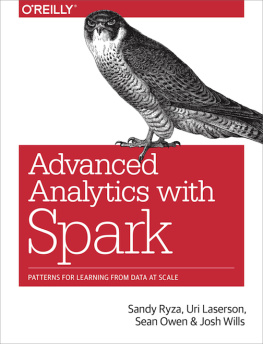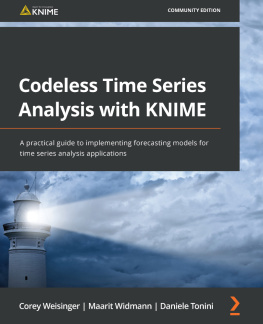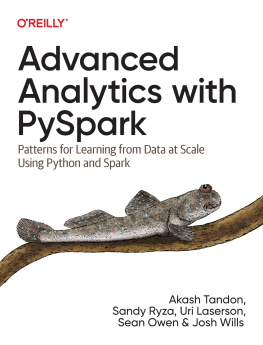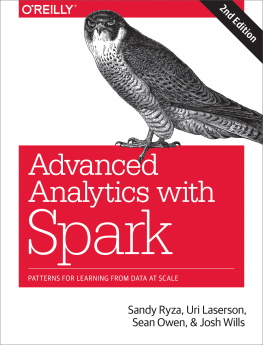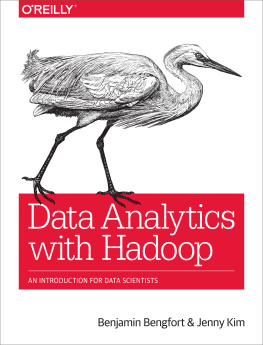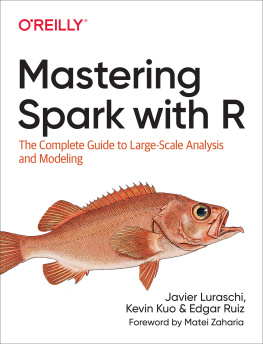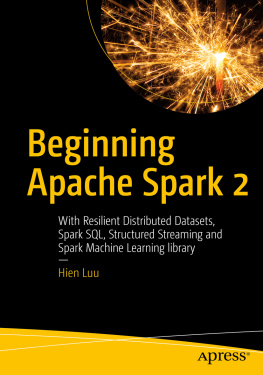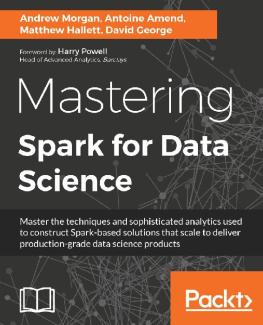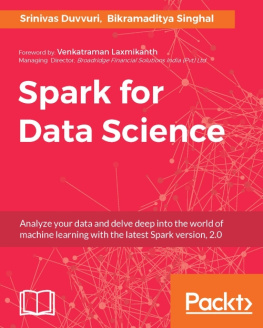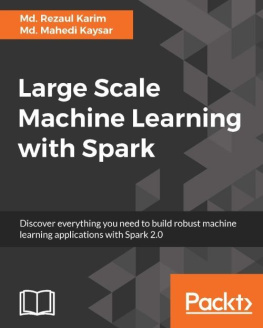Advanced Analytics with Spark
by Sandy Ryza , Uri Laserson , Sean Owen , and Josh Wills
Copyright 2015 Sandy Ryza, Uri Laserson, Sean Owen, and Josh Wills. All rights reserved.
Printed in the United States of America.
Published by OReilly Media, Inc. , 1005 Gravenstein Highway North, Sebastopol, CA 95472.
OReilly books may be purchased for educational, business, or sales promotional use. Online editions are also available for most titles (http://safaribooksonline.com). For more information, contact our corporate/institutional sales department: 800-998-9938 or corporate@oreilly.com .
- Editor: Marie Beaugureau
- Production Editor: Kara Ebrahim
- Copyeditor: Kim Cofer
- Proofreader: Rachel Monaghan
- Indexer: Judy McConville
- Interior Designer: David Futato
- Cover Designer: Ellie Volckhausen
- Illustrator: Rebecca Demarest
- April 2015: First Edition
Revision History for the First Edition
- 2015-03-27: First Release
See http://oreilly.com/catalog/errata.csp?isbn=9781491912768 for release details.
The OReilly logo is a registered trademark of OReilly Media, Inc. Advanced Analytics with Spark, the cover image of a peregrine falcon, and related trade dress are trademarks of OReilly Media, Inc.
While the publisher and the authors have used good faith efforts to ensure that the information and instructions contained in this work are accurate, the publisher and the authors disclaim all responsibility for errors or omissions, including without limitation responsibility for damages resulting from the use of or reliance on this work. Use of the information and instructions contained in this work is at your own risk. If any code samples or other technology this work contains or describes is subject to open source licenses or the intellectual property rights of others, it is your responsibility to ensure that your use thereof complies with such licenses and/or rights.
978-1-491-91276-8
[LSI]
Foreword
Ever since we started the Spark project at Berkeley, Ive been excited about not just building fast parallel systems, but helping more and more people make use of large-scale computing. This is why Im very happy to see this book, written by four experts in data science, on advanced analytics with Spark. Sandy, Uri, Sean, and Josh have been working with Spark for a while, and have put together a great collection of content with equal parts explanations and examples.
The thing I like most about this book is its focus on examples, which are all drawn from real applications on real-world data sets. Its hard to find one, let alone ten examples that cover big data and that you can run on your laptop, but the authors have managed to create such a collection and set everything up so you can run them in Spark. Moreover, the authors cover not just the core algorithms, but the intricacies of data preparation and model tuning that are needed to really get good results. You should be able to take the concepts in these examples and directly apply them to your own problems.
Big data processing is undoubtedly one of the most exciting areas in computing today, and remains an area of fast evolution and introduction of new ideas. I hope that this book helps you get started in this exciting new field.
Matei Zaharia, CTO at Databricks and Vice President, Apache Spark
Preface
Sandy Ryza
I dont like to think I have many regrets, but its hard to believe anything good came out of a particular lazy moment in 2011 when I was looking into how to best distribute tough discrete optimization problems over clusters of computers. My advisor explained this newfangled Spark thing he had heard of, and I basically wrote off the concept as too good to be true and promptly got back to writing my undergrad thesis in MapReduce. Since then, Spark and I have both matured a bit, but one of us has seen a meteoric rise thats nearly impossible to avoid making ignite puns about. Cut to two years later, and it has become crystal clear that Spark is something worth paying attention to.
Sparks long lineage of predecessors, running from MPI to MapReduce, makes it possible to write programs that take advantage of massive resources while abstracting away the nitty-gritty details of distributed systems. As much as data processing needs have motivated the development of these frameworks, in a way the field of big data has become so related to these frameworks that its scope is defined by what these frameworks can handle. Sparks promise is to take this a little furtherto make writing distributed programs feel like writing regular programs.
Spark will be great at giving ETL pipelines huge boosts in performance and easing some of the pain that feeds the MapReduce programmers daily chant of despair (why? whyyyyy?) to the Hadoop gods. But the exciting thing for me about it has always been what it opens up for complex analytics. With a paradigm that supports iterative algorithms and interactive exploration, Spark is finally an open source framework that allows a data scientist to be productive with large data sets.
I think the best way to teach data science is by example. To that end, my colleagues and I have put together a book of applications, trying to touch on the interactions between the most common algorithms, data sets, and design patterns in large-scale analytics. This book isnt meant to be read cover to cover. Page to a chapter that looks like something youre trying to accomplish, or that simply ignites your interest.
Whats in This Book
The first chapter will place Spark within the wider context of data science and big data analytics. After that, each chapter will comprise a self-contained analysis using Spark. The second chapter will introduce the basics of data processing in Spark and Scala through a use case in data cleansing. The next few chapters will delve into the meat and potatoes of machine learning with Spark, applying some of the most common algorithms in canonical applications. The remaining chapters are a bit more of a grab bag and apply Spark in slightly more exotic applicationsfor example, querying Wikipedia through latent semantic relationships in the text or analyzing genomics data.
Using Code Examples
Supplemental material (code examples, exercises, etc.) is available for download at https://github.com/sryza/aas.
This book is here to help you get your job done. In general, if example code is offered with this book, you may use it in your programs and documentation. You do not need to contact us for permission unless youre reproducing a significant portion of the code. For example, writing a program that uses several chunks of code from this book does not require permission. Selling or distributing a CD-ROM of examples from OReilly books does require permission. Answering a question by citing this book and quoting example code does not require permission. Incorporating a significant amount of example code from this book into your products documentation does require permission.
We appreciate, but do not require, attribution. An attribution usually includes the title,author, publisher, and ISBN. For example: "Advanced Analytics with Spark by Sandy Ryza, Uri Laserson, Sean Owen, and Josh Wills (OReilly). Copyright 2015 Sandy Ryza, Uri Laserson, Sean Owen, and Josh Wills,978-1-491-91276-8.
If you feel your use of code examples falls outside fair use or the permission given above, feel free to contact us at .
Safari Books Online
Safari Books Online is an on-demand digital library that delivers expert content in both book and video form from the worlds leading authors in technology and business.

